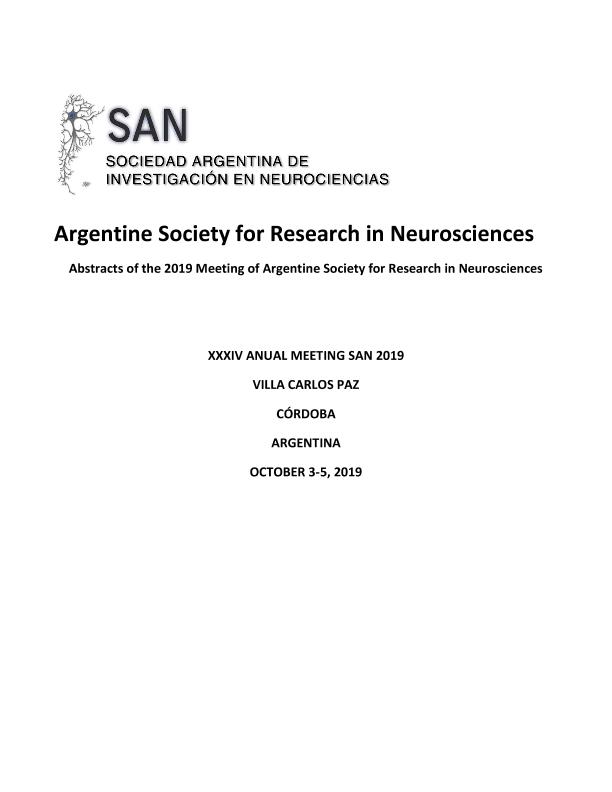Mostrar el registro sencillo del ítem
dc.contributor.author
Stupniki, Sofia

dc.contributor.author
Dionisio, Leonardo Raul

dc.contributor.author
Perotti, Gabriel Tomás
dc.contributor.author
Barila, Esteban Pablo

dc.contributor.author
Dye, Leandro
dc.contributor.author
Kovacs, Adrienn
dc.contributor.author
Bayasgalan, Tsogbadrakh
dc.contributor.author
Pal, Balazs
dc.contributor.author
Spitzmaul, Guillermo Federico

dc.date.available
2023-04-24T11:20:55Z
dc.date.issued
2019
dc.identifier.citation
Physiological significance of the KCNQ4-mediated M-current in the pedunculopontine nucleus of the reticular activating system; XXXIV Reunión Anual SAN 2019; Villa Carlos Paz; Argentina; 2019; 139-140
dc.identifier.uri
http://hdl.handle.net/11336/195054
dc.description.abstract
The pedunculopontine nucleus (PPN) is part of the reticular activating system (RAS) which is associated with sleep regulation. The PPN has cholinergic and non-cholinergic neurons. A hallmark of the PPN-cholinergic neurons is the M-current, a slowly activating, non-inactivating voltage-gated potassium current. KCNQ2 to 5 subunit alone or in combination are responsible for the M-current. Our aim was to investigate the contribution of the KCNQ4 subunit to PPN neuronal function. We used a transgenic mouse model for KCNQ4 (knock-out (KO)) and one with fluorescent-labeled cholinergic neurons (tdTomatoStop+ChAT::Cre). We analyzed KCNQ4 expression by real-time PCR and its localization using immunofluorescence. We also studied the M-current by electrophysiology on brain slices, the contribution of KCNQ4 to neuronal activity and its influence on circadian rhythm. We found a weak mRNA expression of KCNQ4 in PPN and the protein was located only on cholinergic neurons of the external limits of the nucleus. M-current was present in most of cholinergic neurons in WT animals, but absent in 40% of them in the KO ones. These last also exhibited behavioral alterations in the activity cycles showing a 5-hour increase and a higher sensitivity to changes in the light/darkness cycles. In summary, we found that only a subpopulation of PPN cholinergic neurons have KCNQ4-dependent M-current and this subunit contributes to modulate the circadian rhythm through the activity of the RAS system.
dc.format
application/pdf
dc.language.iso
eng
dc.publisher
Sociedad Argentina de Investigación en Neurociencias
dc.rights
info:eu-repo/semantics/openAccess
dc.rights.uri
https://creativecommons.org/licenses/by-nc-sa/2.5/ar/
dc.subject
NEURAL
dc.subject
CIRCUITS
dc.subject
BRAIN
dc.subject
KCNQ4
dc.subject.classification
Bioquímica y Biología Molecular

dc.subject.classification
Ciencias Biológicas

dc.subject.classification
CIENCIAS NATURALES Y EXACTAS

dc.title
Physiological significance of the KCNQ4-mediated M-current in the pedunculopontine nucleus of the reticular activating system
dc.type
info:eu-repo/semantics/publishedVersion
dc.type
info:eu-repo/semantics/conferenceObject
dc.type
info:ar-repo/semantics/documento de conferencia
dc.date.updated
2023-02-16T10:12:31Z
dc.journal.pagination
139-140
dc.journal.pais
Argentina

dc.journal.ciudad
Buenos Aires
dc.description.fil
Fil: Stupniki, Sofia. Consejo Nacional de Investigaciones Científicas y Técnicas. Centro Científico Tecnológico Conicet - Bahía Blanca. Instituto de Investigaciones Bioquímicas de Bahía Blanca. Universidad Nacional del Sur. Instituto de Investigaciones Bioquímicas de Bahía Blanca; Argentina
dc.description.fil
Fil: Dionisio, Leonardo Raul. Consejo Nacional de Investigaciones Científicas y Técnicas. Centro Científico Tecnológico Conicet - Bahía Blanca. Instituto de Investigaciones Bioquímicas de Bahía Blanca. Universidad Nacional del Sur. Instituto de Investigaciones Bioquímicas de Bahía Blanca; Argentina. Universidad Nacional del Sur. Departamento de Biología, Bioquímica y Farmacia; Argentina
dc.description.fil
Fil: Perotti, Gabriel Tomás. Universidad Nacional del Sur. Departamento de Biología, Bioquímica y Farmacia; Argentina
dc.description.fil
Fil: Barila, Esteban Pablo. Consejo Nacional de Investigaciones Científicas y Técnicas. Centro Científico Tecnológico Conicet - Bahía Blanca. Instituto de Investigaciones Bioquímicas de Bahía Blanca. Universidad Nacional del Sur. Instituto de Investigaciones Bioquímicas de Bahía Blanca; Argentina
dc.description.fil
Fil: Dye, Leandro. Consejo Nacional de Investigaciones Científicas y Técnicas. Centro Científico Tecnológico Conicet - Bahía Blanca. Instituto de Investigaciones Bioquímicas de Bahía Blanca. Universidad Nacional del Sur. Instituto de Investigaciones Bioquímicas de Bahía Blanca; Argentina
dc.description.fil
Fil: Kovacs, Adrienn. University of Debrecen; Hungría
dc.description.fil
Fil: Bayasgalan, Tsogbadrakh. University of Debrecen; Hungría
dc.description.fil
Fil: Pal, Balazs. University of Debrecen; Hungría
dc.description.fil
Fil: Spitzmaul, Guillermo Federico. Consejo Nacional de Investigaciones Científicas y Técnicas. Centro Científico Tecnológico Conicet - Bahía Blanca. Instituto de Investigaciones Bioquímicas de Bahía Blanca. Universidad Nacional del Sur. Instituto de Investigaciones Bioquímicas de Bahía Blanca; Argentina
dc.relation.alternativeid
info:eu-repo/semantics/altIdentifier/url/https://saneurociencias.org.ar/congresos-san-2/
dc.conicet.rol
Autor

dc.conicet.rol
Autor

dc.conicet.rol
Autor

dc.conicet.rol
Autor

dc.conicet.rol
Autor

dc.conicet.rol
Autor

dc.conicet.rol
Autor

dc.conicet.rol
Autor

dc.conicet.rol
Autor

dc.coverage
Nacional
dc.type.subtype
Congreso
dc.description.nombreEvento
XXXIV Reunión Anual SAN 2019
dc.date.evento
2019-10-03
dc.description.ciudadEvento
Villa Carlos Paz
dc.description.paisEvento
Argentina

dc.type.publicacion
Book
dc.description.institucionOrganizadora
Sociedad Argentina de Investigación en Neurociencias
dc.source.libro
SAN Sociedad Argentina de Investigación en Neurociencias
dc.date.eventoHasta
2019-10-05
dc.type
Congreso
Archivos asociados
